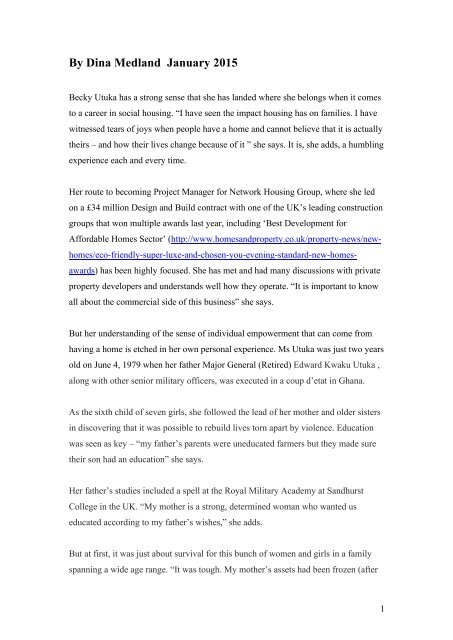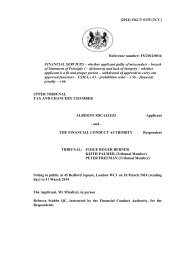Becky Utuka Interview Network Housing
Becky Utuka Interview Network Housing
Becky Utuka Interview Network Housing
Create successful ePaper yourself
Turn your PDF publications into a flip-book with our unique Google optimized e-Paper software.
By Dina Medland January 2015<br />
<strong>Becky</strong> <strong>Utuka</strong> has a strong sense that she has landed where she belongs when it comes<br />
to a career in social housing. “I have seen the impact housing has on families. I have<br />
witnessed tears of joys when people have a home and cannot believe that it is actually<br />
theirs – and how their lives change because of it ” she says. It is, she adds, a humbling<br />
experience each and every time.<br />
Her route to becoming Project Manager for <strong>Network</strong> <strong>Housing</strong> Group, where she led<br />
on a £34 million Design and Build contract with one of the UK’s leading construction<br />
groups that won multiple awards last year, including ‘Best Development for<br />
Affordable Homes Sector’ (http://www.homesandproperty.co.uk/property-news/newhomes/eco-friendly-super-luxe-and-chosen-you-evening-standard-new-homesawards)<br />
has been highly focused. She has met and had many discussions with private<br />
property developers and understands well how they operate. “It is important to know<br />
all about the commercial side of this business” she says.<br />
But her understanding of the sense of individual empowerment that can come from<br />
having a home is etched in her own personal experience. Ms <strong>Utuka</strong> was just two years<br />
old on June 4, 1979 when her father Major General (Retired) Edward Kwaku <strong>Utuka</strong> ,<br />
along with other senior military officers, was executed in a coup d’etat in Ghana.<br />
As the sixth child of seven girls, she followed the lead of her mother and older sisters<br />
in discovering that it was possible to rebuild lives torn apart by violence. Education<br />
was seen as key – “my father’s parents were uneducated farmers but they made sure<br />
their son had an education” she says.<br />
Her father’s studies included a spell at the Royal Military Academy at Sandhurst<br />
College in the UK. “My mother is a strong, determined woman who wanted us<br />
educated according to my father’s wishes,” she adds.<br />
But at first, it was just about survival for this bunch of women and girls in a family<br />
spanning a wide age range. “It was tough. My mother’s assets had been frozen (after<br />
1
the coup) and she had to find a place for us to live. We rented at first but she believed<br />
in having a permanent home. The plot of land next to our rental was for sale – she<br />
bought it and then built a four bedroom home” says Ms <strong>Utuka</strong>.<br />
“Some of us lived with aunties and uncles. We had to be mindful about what we said,<br />
and with whom we associated. It was very scary at times – I remember once at<br />
primary school she came quickly to get us because suddenly there were rumours of<br />
another coup.”<br />
Asked what it was like living in a house of women, she laughs, saying: “There was a<br />
lot of female support. It was great living with my sisters who were so much older than<br />
me – but then sometimes when I wanted to do things and was told I couldn’t do them,<br />
it was hard.”<br />
In an all-female household “we never had specific male/female tasks – like washing<br />
the car –we were brought up to just do whatever needed doing” says Ms <strong>Utuka</strong>.<br />
Having first chosen to study for a BsC in Design at the College of Architecture &<br />
Planning at Ghana’s University of Science & Technology, she took a ‘Gap Year’ in<br />
London to be with her sister, and changed her mind. “My mother was not pleased.<br />
She kept saying ‘you have to finish what you start” she says.<br />
But, having decided she wanted to be in London where she had family and support,<br />
she did her research on the property sector and opted for an MsC at the University of<br />
Greenwich in Real Estate Development and Investment. “The core content was real<br />
estate development but I wanted something different. This seemed to offer a chance to<br />
keep my options open: I could work for a developer, an investment fund – and also<br />
social housing” she says today.<br />
In her first working role with Basildon District Council as a student placement, she<br />
attended a meeting with Swan <strong>Housing</strong> Group – and saw the ‘Graduate Projects<br />
Manager’ job advertised on the screen on the way in. Later, in that very role she was<br />
to gain hands-on experience of housing development, procurement and finance – and<br />
to manage projects during the defects liability period.<br />
2
Moving up through the ranks at Swan <strong>Housing</strong> to become Project Manager, Ms <strong>Utuka</strong><br />
was in full-time employment and married with a seven-month old son when she<br />
undertook a Master’s degree at the College of Estate Management in Reading. This<br />
gave her a Graduate Diploma in Construction Surveying.<br />
In August 2013 she joined <strong>Network</strong> <strong>Housing</strong> Group, and has since managed a number<br />
of complex Design & Build contracts, sales agreements, development agreements and<br />
construction management Projects. But her appetite for continuing education remains<br />
undiminished. “I plan to study design or architecture further – it would be great to<br />
complete what I started in my undergraduate degree” she tells me.<br />
She is also keen to improve her understanding of construction law and is working on a<br />
pilot scheme with <strong>Network</strong> <strong>Housing</strong> to explore construction package procurement and<br />
the negotiation of contracts directly from the supply chain. As central London tops the<br />
world as the most expensive city for construction<br />
(http://www.ft.com/cms/s/0/a31b9be8-9bea-11e4-a6b6-<br />
00144feabdc0.html#axzz3OvIHWSHi) there are multiple challenges ahead for the<br />
social housing sector.<br />
According to a report published this week by London First, the business advocacy<br />
group, about 50,000 new homes are needed each year - yet less than half of those are<br />
being built. (http://londonfirst.co.uk/campaigns/world-class-infrastructure/)<br />
There is certainly no shortage of demand for talent and innovation in this sector, and<br />
for the businesses that could lose much-needed talent as a result of a lack of<br />
affordable housing.<br />
Ms <strong>Utuka</strong>, currently also finding time to volunteer for BME charities in deprived<br />
areas across North London, is also keen one day to return to Ghana and assist with<br />
housing development.<br />
3
In the meantime, she holds close the words of the poet William Ernest Henley who<br />
was first introduced to her by her father: “I am the master of my fate: I am the captain<br />
of my soul.”<br />
ends<br />
4




